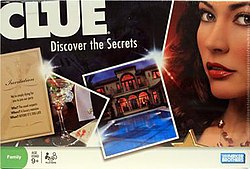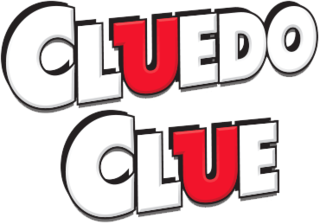
Cluedo, known as Clue in North America, is a murder mystery game for three to six players that was devised in 1943 by British board game designer Anthony E. Pratt. The game was first manufactured by Waddingtons in the United Kingdom in 1949. Since then, it has been relaunched and updated several times, and it is currently owned and published by the American game and toy company Hasbro.
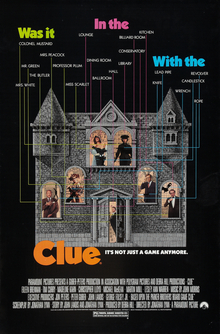
Clue is a 1985 American black comedy mystery film based on the board game of the same name. Directed by Jonathan Lynn, who co-wrote the script with John Landis, and produced by Debra Hill, it stars the ensemble cast of Eileen Brennan, Tim Curry, Madeline Kahn, Christopher Lloyd, Michael McKean, Martin Mull, and Lesley Ann Warren, with Colleen Camp and Lee Ving in supporting roles.
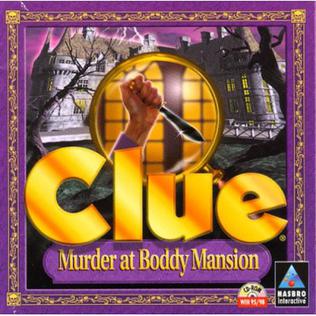
Clue is a 1998 video game based on the board game of the same name. It is also known as Clue: Murder at Boddy Mansion or Cluedo: Murder at Blackwell Grange, depending on whether the country of release used American or British English.
Cluedo is a British game show based on the board game of the same name. Each week, a reenactment of the murder at the stately home Arlington Grange of a visiting guest was played and, through a combination of interrogating the suspects and deduction, celebrity guests had to discover who committed the murder, which of six weapons and in which room it was committed, whilst viewers were invited to play along at home.
Clue The Musical is a musical with a book by Peter DePietro, music by Galen Blum, Wayne Barker and Vinnie Martucci, and lyrics by Tom Chiodo, based on the board game Clue. The plot concerns a murder at a mansion, occupied by several suspects, that is solved by a detective, while the ending is decided by the audience.
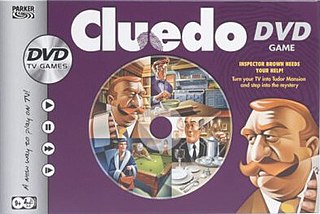
Cluedo DVD Game is a deduction/murder-mystery interactive DVD movie game based on the Cluedo franchise. It was published by Hasbro and Parker Brothers in the US in 2006, and designed by Rob Daviau. Previously, the Cluedo DVD Game had been released in the UK in October 2005, shortly followed by a French edition. It supports 3-5 players, and each case runs about 60 minutes.
Clue Mysteries are two books released in 2003 and 2004 based upon the Clue board game. Both were written by Canadian author, Vicki Cameron. Cameron lives in Ontario.
Deduction board games are a genre of board game in which the players must use deductive reasoning and logic in order to win the game. While many games, such as bridge or poker require the use of deductive reasoning to some degree, deduction board games feature deductive reasoning as their central mechanic.

Clue: Parker Brothers' Classic Detective Game is a North American-exclusive video game published for the Super Nintendo Entertainment System and Sega Genesis video game consoles. It is based on the popular board game of the same name.
Hasbro Family Game Night is a series of video games that adapt board games manufactured by Hasbro.

Cluedo is an Australian whodunnit game show based on the British series of the same name and inspired by the 1949 board game Cluedo. It was produced by Crawford Action Time in conjunction with Nine Network. The show saw a studio audience view a dramatised scenario, then complete rounds of interrogating the six suspects on stage in character and viewing further evidence through a pre-recorded criminal investigation. Players then deduced the solution to the murder case using a trio of computer-linked electronic dials, and after the solution was revealed the first person who had locked-in this combination won a prize.

Mystery Mansion is the name of a series of board games in which players search furniture and other objects inside a mansion to locate a hidden treasure or stash of money.
Anthony Ernest Pratt was the inventor of the English detective-themed board game Cluedo, currently owned and marketed by American entertainment company Hasbro.
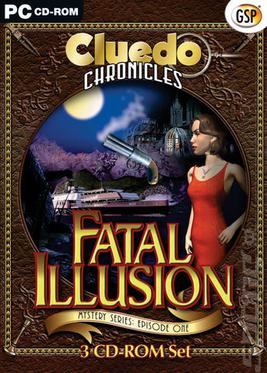
Clue Chronicles: Fatal Illusion is a Windows point-and-click adventure game based on the Cluedo franchise, known as Clue in North America. It is a reinterpretation and adaption of the Clue board game as an adventure game including many of the original characters. The game was distributed with a variety of covers, each featuring a different murder weapon.
There have been two distinct mobile adaptations of the Hasbro board game Clue.
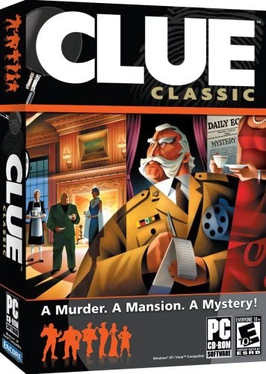
Clue Classic is a single-player, interactive video game based on Hasbro's Cluedo franchise. It was developed by Games Cafe and published by Reflexive Entertainment on June 3, 2008.
Cluedo is a murder mystery board game for three to six players.
Cluedo, known as Clue in North America, is a murder mystery-themed multimedia franchise started in 1949 with the manufacture of the Cluedo board game. The franchise has since expanded to film, television game shows, book series, computer games, board game spinoffs, a comic, a play, a musical, jigsaws, card games, and other media.
Cluedo is a game show broadcast on France 3, hosted by Christian Morin and by Marie-Ange Nardi, adapted from the British game show itself inspired by the board game Cluedo. It aired for two seasons from 1994-5. The cast consisted of Bernard Menez as Doctor Green, Andréa Ferréol as Mrs Peacock, André Pousse as Colonel Mustard, Marie-Pierre Casey as Mrs White, David Brécourt as Professor Plum, and Carole Fantony as Miss Scarlett.
